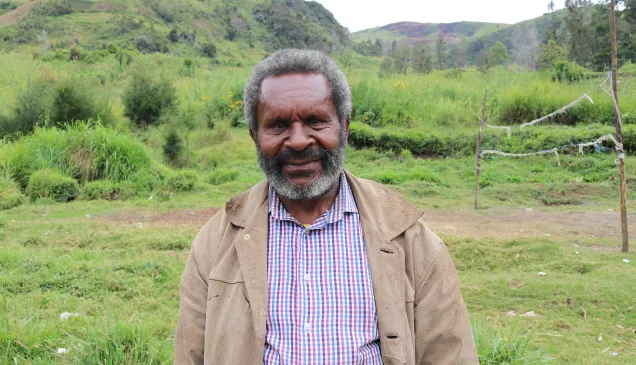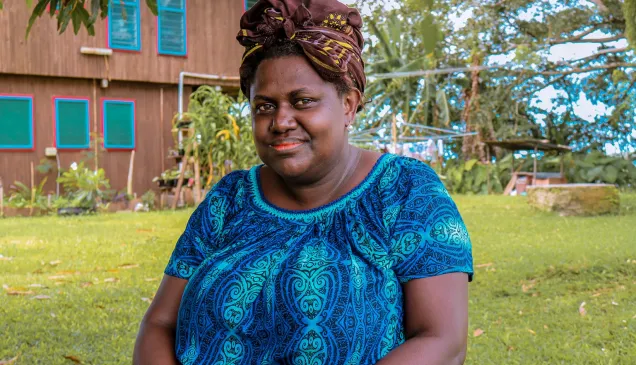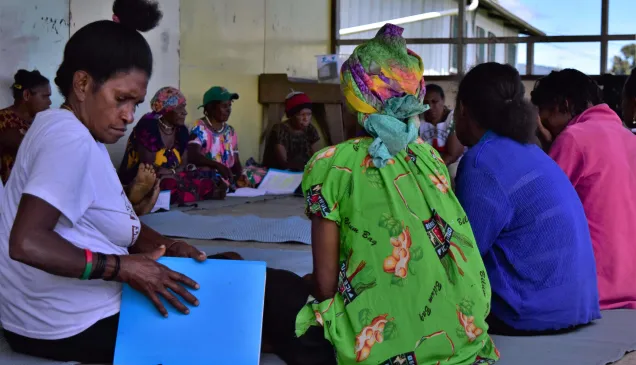Papua New Guinea: ICRC Activities 2021
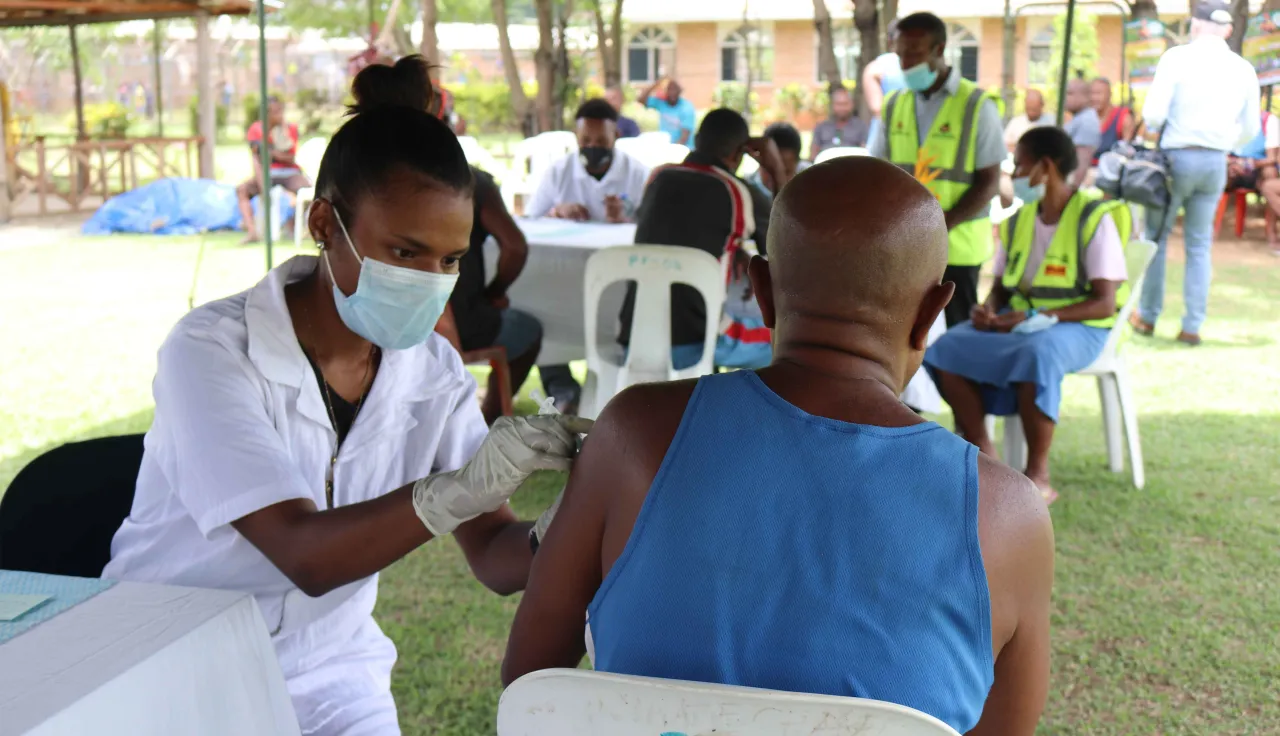
Missing persons: the right to know
In situations of armed conflicts and other situations affected by violence, countless families suffer great anguish when loved ones go missing. In Bougainville, ICRC continues to support families whose loved ones went missing during the Bougainville crisis, find solace and closure to their grief.
In 2021, the ICRC;
- presented to the Bougainville Government a draft Terms of Reference (ToR) for the Mechanism explaining its purpose, mandate, responsibilities, and structure. A presentation was provided on the draft ToR, while acting as a focal point for transversal resources within the government and families of the missing.
- during the International Day of Disappeared (IDoD) a Missing Monument was unveiled in Siwai, benefitting 49 families whose family members went missing during the Bougainville crisis.
- IDoD assistance were provided to Siwai, Aita and Sipotavai communities benefiting 89 families of the missing.
- held a Families of the Missing (FoM) conference virtually connecting 20 FoM from Bougainville with 500 other FoM from around the globe.
- a short video from the global conference with prominence on a FoM in Bougainville was produced and shared on ICRC platforms and social media.
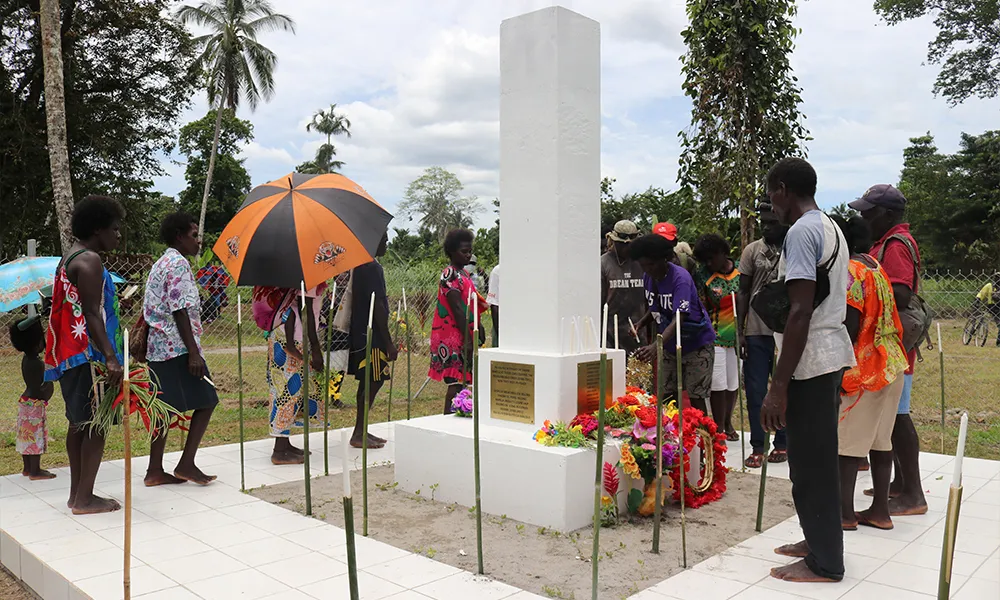
Families of the Missing Persons in Siwai District, South Bougainville unveiling a monument to commemorate those who went missing during the Bougainville Crisis.
Support to restoring and maintaing family links
Due to COVID-19, family vists were postponed in 2021.
With the participation of the Papua New Guinea Red Cross Society (PNGRCS), the ICRC continues supporting authorities to maintain family links of Bougainville detainees with their family across Bougainville and the East New Britain Province. Due to COVID-19 safety measures and travel restrictions, family visits were postponed in 2021.
Support to detention authorities
ICRC continued visits to a total of 15 places of detention 6 prisons and 9 police lockups in 2021. The six prisons, which together house around half the total prison population in PNG are spread across the country, including the Autonomous Region of Bougainville. The potential for COVID-19 to cause a catastrophic outbreak triggered an application by the delegation for extra resources, which were used to create a 'surge' team, which co-produced plans for pilot projects at four key prisons with renovations and improvements to be supported by Wathab and a revised reception process, including medical screening, supported by healthcare in detention.
In 2021, the ICRC;
- provided quarterly visits to 15 places of detention. At least one joint monitoring visit with a detention doctor to all six prisons and five police lock ups (approximately 3000 detainees).
- formed a multidisciplinary COVID-19 'surge' team. The team identified four key pilot prisons to mount a COVID-19 response, based on improved infection, prevention and control principles, including screening and quarantine for newly arrived detainees.
- key COVID-19 related medical equipment, including pulse oximeters and non-touch thermometers were donated to the 15 prisons with health facilities.
- monthly to quarterly donations of soaps, cleaning materials and personal hygiene items were made in 2021 to 15 places of detention.
- ICRC convened a technical working group, including the CS executive and other stakeholders including the National Pandemic Controllers Office, WHO and the National Department of Health. The group continues to provide oversight for the COVID-19 response and helps to steer other health improvement activity in detention.
- ICRC partnered with a vaccine researcher to deliver awareness sessions on vaccination to detainees at five prisons and three police lockups, reaching a total of approximately 1800 beneficiaries. With partnership from local health authorities, more than 30% of detainees have been vaccinated (in comparison with only approx. 4% of the general population).
- ICRC steered publication of a CS COVID-19 Response Plan, a set of standard operating procedures for a prison to prevent, contain and mitigate an outbreak of COVID-19. It also published a leaflet for prison health staff to clinically assess patients with COVID-19, to support appropriate, timely referral to hospital.
- in August, the PSA and detention doctors ran a session on responding to Covid-19 as part of the CS Commanders Conference. In October, the prison systems advisor ran a workshop on prison management with nine senior leaders from the Correctional Service.
- conducted a training on a new protocol for reception, including an initial medical assessment were conducted at two pilot prisons. On separate occasions, simulation exercises involving staff from all relevant departments (17 staff at each event) were held at the two pilot prisons.
- to mitigate in places of detention the effects of COVID-19 three prisons (Bomana, Baisu and Kerevat) have been selected where CI authorities together with the ICRC adapt existing infrastructure to quarantine and isolation wards.
- adaptation of a medical consultation room at Tari PLU, Hela (31 detainees).
- provided 25 handwashing stations to two CIs (Baisu and Bui Iebi) and 3 PLUs (Mendi, Tari and Wabag) to upscale Covid preventative measures (556 detainees and staff)
- supported two vegetable gardening in two prisons, Baisu and Bui Iebi (EcoSec), aimed to improve vegetable production and diversification of food consumption of detainees. organized basic vegetable gardening skill training targeting low-risk detainees and detention staff in Baisu prison, where a total of 47 detainees and detention staff participated.
Preventing effects of armed violence
During the year the ICRC has conducted awareness sessions along with drama shows to communities, schools and during organized events such as Hagen, Enga and Goroka Cultural shows including different groups within its area of operations. The sessions help people understand ICRC mandate, area of work, activities and different key messages on minimizing the consequences of tribal fights. The ICRC also conducted awareness to improve acceptance, security and access while working to protect and assist people affected by tribal fights.
Helping those affected by armed violence
In 2021, ICRC continued its assistance to those affected by armed violence making sure affected communities receive the necessary support in relief items, trainings in agriculture, business development and tailoring skills. ICRC also provided technical vocational education scholarship opportunities under its program on Access to Education and structural response to help meet essential needs of communities.
In 2021, the ICRC;
- distributed EHI and basic-agriculture technical training were provided as a relief response to assist some 2'891 households (17'346 people) affected by tribal fights. The distributed EHI kits composed of Blankets, Mast, Tarpaulins, Shelter tool kits, soap, buckets, and basins.
- supported some 350 farmers with agricultural inputs (seeds and tools) and cash for fertilizer support.
- ensured 11 vulnerable women in Mount Hagen town received business development and tailoring skill training. The women group will receive inputs support in the 2022 1st quarter to start their tailoring business that includes the production of fabric facemasks.
- a total of 171 displaced farmers and host communities, who were affected by the Ayaka tribal fight in Enga AoR, received capacity-building training on vegetable gardening and management.
- under the framework of Access to Education initiatives, aiming to support interested candidates to study in NIPA and Hulia TVET colleges, 36 candidates were selected and expected to receive the ICRC's supported scholarship in the 2022 academic year.
- upgraded three health structures (Uma, Yango, Tumundan) sanitation facilities and facilities for medical waste.
- installation of two toilets and an incinerator in Uma, SHP (30 consultations/day).
- upgraded the maternity ward and installed two toilets at Yango health center, Enga (15 consultations/day).
- installed two toilets and an incinerator in Tumundan, Enga (65 consultations/day)
- upgraded five classrooms at Nipa TVET, SHP (120 students).
- supported the construction of a double classroom at Hulia TVET, Hela benefiting 500 students.
- installed a rainwater harvesting system at Mulisosh primary school, Enga benefiting 470 students.
- provided a rainwater harvesting system for Wabulaka elementary school, Hela benefiting 150 students.
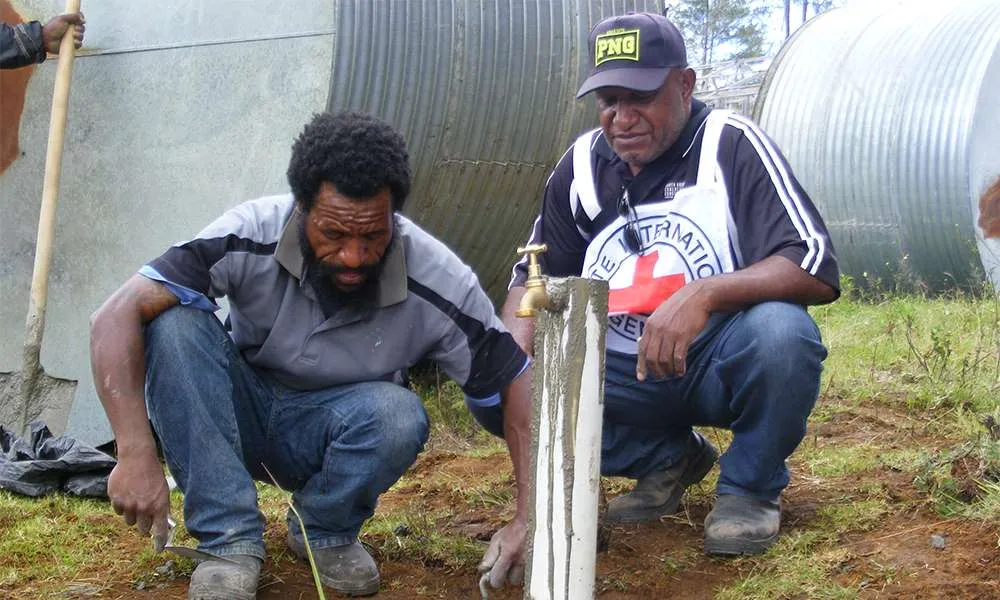
A water tap connected to a rainwater harvesting system being installed at Mulisosh Primary School, Enga
Supporting health care
In collaboration with provincial health authorities, church run health services, and local communities, the ICRC in the Highlands and Bougainville provided the following in 2021;
- supported a FAT training in Buka office for 30 participants facilitated by PNGRC.
- commenced two new midwifery sponsorship in 2021 bringing to a total of five students currently supported by the sponsorship program.
- 30 informative sessions on high risk factors in pregnancy were conducted for 120 women volunteers (Enga and SHP).
- 10 community health committee meetings and 10 monthly monitoring and supervision visits were conducted at the ICRC supported primary health care facilities.
- provided ad hoc donations of dressing kits to hospitals (Arawa, Buka, Mt. Hagen, Mendi, Tari, Wabag) including donation of medical and non-medical items to five ICRC supported facilities in the Highlands.
- two volunteer vaccinators were supported with monthly incentives at Pureni Health Center, Hela Province, whilst transport reimbursements were provided for 30 patients who were referred to the hospitals (complicated deliveries, wounds, and other acute emergencies).
- 12 health stakeholder meetings were held with PHAs, ECPNG and Catholic Church Health Services including six in-house training (consultation process, health indicator Chart) for PHC staff (Pureni, Walete, Karita & Yango PHCs).
- Six batches of group support session for victims of violence in Hela and Enga, for 72 participants facilitated by 23 facilitators trained by MHPSS and three trainings on sexual violence (SV) for Village Birth Attendants (VBAs) in Hela and Enga for 53 VBAs.
- produced a video on VOSV testimony in collaboration with Communication and Protection departments.
- group support for Tari Provincial Hospital COVID-19 frontline responders on topics regarding COVID- 19 related stress, burnouts, compassion fatigue, self-care and positive coping benefiting 17 participants
- COVID-19 response assessments of the Hospitals and Health Centers were conducted at (Tari, Mendi, Mount Hagen, Wabag provincial hospitals, Magarima, Koroba, Ialibu, Nipa District hospitals, Kagua, Laiagam District Hospitals)
- facilitated a COVID- 19 - Basic Emergency Course for eight participants in Mendi, SHP and participated in Western Highlands COVID-19 Task Force meetings. PPE donations including furniture and hospital beds were made to the hospitals and district health centers.
Support to Papua New Guinea Red Cross Society
The Papua New Guinea Red Cross Society plays a key role in the ICRC's area of responsibilities. The collaboration has resulted in a number of positive outcomes achieved in 2021 which has further led to strengthening the movement's partnership in the country.
In 2021, the ICRC;
- facilitated a refresher training (field practical) for five EcoSec volunteers on Agro training.
- 42 specialist EcoSec volunteers were involved in various activities in areas of responsibilities in Enga, SHP and Hela.
- donated three tents and five First Aid kits to the PNGRC Bougainville branch
- donated virtual conferencing equipment to PNGRC in HQ support (procurement done in 2021 and actual handover in 2022).
- facilitated over 20 meetings including the PNGRC General Assembly in Lae, a regional workshop in Port Moresby on the National Disaster Management Act review, including convening of the interview panel for the Comms Officer, and other ad hoc meetings.
- funded four positions in 2021 including the F&A Manager, the Mt Hagen Branch Coordinator of PNGRC, the Bougainville Branch Coordinator of PNGRC, and the Communication and Dissemination Officer.
Working with the Royal PNG Constabulary, PNG Defence and Academia on IHL
The ICRC in PNG continues to collaborate with the national authorities and the academia on the promotion, development and integration of international humanitarian law and human rights law in the country.
In 2021, the ICRC;
- conducted a total of four workshops, one with the RPNGC Centre of Excellence and three with Bougainville Police Service covering the entire region of Bougainville. 42 members of the police, both Commissioned and noncommissioned officers participated in these trainings and workshops.
- pre deployment briefings were held with the Military for the Bravo and Charlie Companies in Moem Barracks with 61 personnel receiving useful information on the ICRC's mission, mandate and working modalities as well as on international human rights and humanitarian principles.
- two separate one-day workshops were organized for the engineering battalion and the officer cadets of the Joint Forces Academy in Igam Barracks over three days. 35 members of the engineering battalion and 45 officer cadets of the Joint Forces Academy respectively attended the workshops. In addition, four officers of the PNGDF participated in the Senior Workshop on Military Operations (SWIRMO).
- ICRC promoted COVID-19 prevention measures to all the provincial police commanders during a meeting in Port Moresby.
IHL and academia
- the National IHL Committee members participated in the Universal Meeting of Commonwealth IHL Committees. The ICRC facilitated for two members of the PNG National IHL Committee to participate.
- ICRC facilitated for four members of the PNG National IHL Committee to attend the 3rd Pacific IHL Roundtable which was held virtually for the first time due to COVID-19. The participants were from DJAG, PNGRCS and PNGDF.

